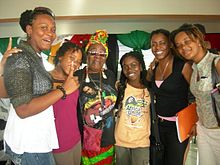 Trinidadian and Tobagonian women during an "Africa Unite" symposium | |
| General Statistics | |
|---|---|
| Maternal mortality (per 100,000) | 46 |
| Women in parliament | 27.4% |
| Women over 25 with secondary education | 59.4% |
| Women in labour force | 54.9% |
| Gender Inequality Index[1] | |
| Value | 0.344 (2021) |
| Rank | 81st out of 191 |
| Global Gender Gap Index[2] | |
| Value | 0.749 (2021) |
| Rank | 37th out of 156 |
| Part of a series on |
| Women in society |
|---|
 |
Women in Trinidad and Tobago are women who were born in, who live in, or are from Trinidad and Tobago. Depending from which island the women came, they may also be called Trinidadian women or Tobagonian women respectively.[3] Women in Trinidad and Tobago excel in various industries and occupations, including micro-enterprise owners, "lawyers, judges, politicians, civil servants, journalists, and calypsonians." Women still dominate the fields of "domestic service, sales, and some light manufacturing."[3]
By participating in Trinidad and Tobago's version of the Carnival, Trinidadian and Tobagonian women demonstrate their "assertive sexuality." Some of them have also been active in so-called Afro-Christian sects and in running the "sou-sou informal rotating credit associations."[3]
Gender roles in Trinidad and Tobago are influenced primarily by legacies of patriarchy and colonialism. Baptiste asserts that historical views of race and colonialism impact Trinidadian culture in such a way that are often excluded from Western feminist studies.[4] "Caribbean gender theory has to wrangle with the boundedness of patriarchy at the same time as it tussles with the barnacles of colonialism and imperialism."[4] Gender performances in Trinidad and Tobago occupy three distinct spaces: physical, social, and cultural. Baptiste argues that the physical, public spaces represent a "postcolonial essentialist collage" in which performances are gendered by the socialization of gender roles according to very essentialist views of men and women. Many public spaces display African imagery, primarily from Nigeria and Ghana because these nations are still Trinidad and Tobago's closest political allies and cultural beacons. These social spaces provide an outlet in the face of a country struggling with increasing crime rates against women.[4]
- ^ "Human Development Report 2021/2022" (PDF). HUMAN DEVELOPMENT REPORTS. Retrieved 22 November 2022.
- ^ "Global Gender Gap Report 2021" (PDF). World Economic Forum. Retrieved 30 November 2021.
- ^ a b c Trinidad and Tobago, everyculture.com
- ^ a b c Baptiste, Jeanne P. (2016). Gender practices and relations at the Jamaat Al Muslimeen in Trinidad (Thesis). doi:10.7282/T33J3G0G. ProQuest 1780310091.